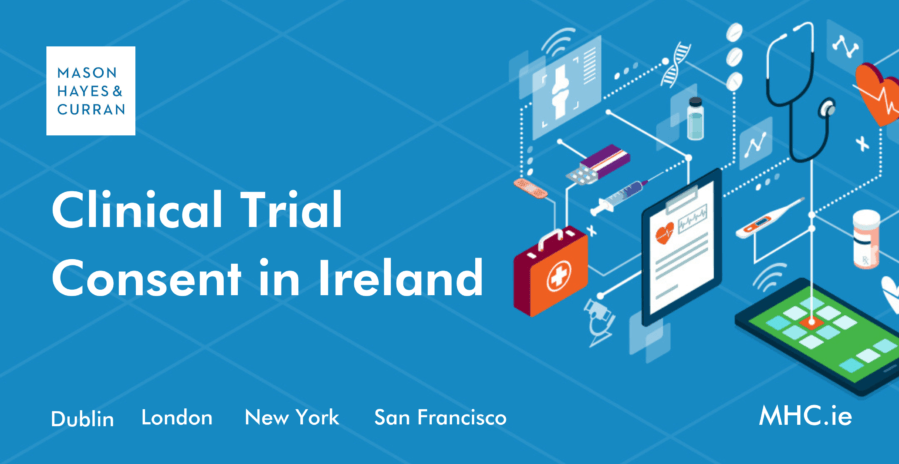
In Ireland, consent from participants to a clinical trial is required under clinical trial specific legislation and data protection legislation. In this article, we summarise the requirements to obtain valid consent under both legislative regimes.
Clinical trial legislation
In the context of clinical trials, consent is referred to as ‘informed consent’ and is a prerequisite for enrolling any subject in a clinical trial. It is more than a box ticking exercise and is intended to aid a subject, make an ‘enlightened’ decision on participating in a clinical trial.[1]
Informed consent is required to be obtained from subjects and submitted as part of the application process for clinical trial approval.
Application for approval
Clinical trials in Ireland are now subject to the new EU Regulation, the EU Clinical Trial Regulation No 536/2014 (CTR), which came into force on 31 January 2022.[2] The CTR repealed the EU Clinical Trial Directive 2001/20/EC (CTD). However, due to transitional provisions, new approval applications may still be submitted under the CTD until 31 January 2023.
Currently, therefore, there are two avenues for approval under clinical trial legislation:
- Under the CTD, applicants must apply separately to both the Health Products Regulatory Authority (HPRA) and a Local Research Ethics Committee (REC) to seek clinical trial approval.[3]
- The CTR aims to reduce the administrative burdens, costs and delays to stakeholders that can occur when applying for clinical trial approval under the CTD. Therefore, under the CTR, applicants are now only required to make a single application for clinical trial approval through a new EU-wide submission portal called the Clinical Trial Information System (CTIS).
All applications for clinical trials in Ireland received under the CTR through the CTIS will be assessed and validated by the new National Research Ethics Committee for Clinical Trials (NREC-CT), which was established by the National Office for Research Ethics Committees (National Office) in March 2020 to reform, simplify and modernise the research ethics committee framework in Ireland.[4] As part of its assessment, the NREC-CT evaluates aspects of how the trial is conducted, which will include recruitment, reward and compensation of subjects, suitability of investigators and trial sites, and damage compensation. It also includes consideration of the informed consent of participants.
Informed consent
As noted above, evidence of informed consent must be submitted as part of an application for clinical trial approval.
The CTR enhances the requirements around informed consent under the CTD and brings improved protection for subjects participating in clinical trials.[5] The CTR establishes clearer guidelines governing the process for gathering participants’ informed consent, including those who are unable to provide consent, such as minors and those with disabilities.
Article 2(2)(21) of the CTR defines ‘informed consent’ as:
“a subject’s free and voluntary expression of his or her willingness to participate in a particular clinical trial, after having been informed of all aspects of the clinical trial that are relevant to the subject’s decision to participate or, in case of minors and of incapacitated subjects, an authorisation or agreement from their legally designated representative to include them in the clinical trial”.
Chapter V of the CTR specifies how informed consent should be obtained and documented:
- Information given to a subject (or their legally designated representative where they cannot provide informed consent) for the purpose of obtaining informed consent must be prepared in writing and be available to the subject or their legally designated representative. It must also be provided in a prior interview by a member of the investigation team.
- Informed consent must be written, dated and signed by the person performing the interview and by the subject or their legally designated representative.
- Where the subject is unable to write, consent may be given and recorded through “appropriate alternative means” in the presence of at least one impartial witness, who must sign and date the informed consent document.
- The subject, or their legally designated representative, must be given a copy of the document or record.
- For incapacitated subjects who are incapable of giving informed consent, this must instead be provided via their legally designated representative. Where that is the case, the legally designated representative has the same rights as the clinical trial subject and certain additional conditions relating to that consent must also be fulfilled, such as those under Article 31 of the CTR.
- For clinical trials involving minor subjects, Article 32 of the CTR specifies the additional conditions that must be met, including obtaining the informed consent of the minor’s legally designated representative and ensuring that the minor participates in the informed consent procedure in a way adapted to his or her age and mental maturity.
Data protection legislation
Explicit consent to process personal data in clinical trial context
Separate to the requirements under the CTD or CTR to obtain informed consent, if you process personal data in the context of “health research” under the “Health Research Regulations”,[6] a data controller is required to obtain the explicit consent of the data subject (Regulation 3(1)(e)).
“Health research” is defined to include the processing of any personal data related to clinical trials for health research purposes (and guidance suggests this includes processing of personal data in the context of clinical trials for medicinal products (“Do the Health Research Regulations 2018 apply to clinical trials of medicinal products?”)). The requirement to obtain explicit consent under the Health Research Regulations is generally interpreted as an additional safeguard to a data controller’s obligation to rely on a legal basis to process personal data under Article 6 GDPR or Article 9 GDPR (with respect to special category data), which may also be consent based.
The requirement to obtain explicit consent can be dispensed with by applying to the Health Research Consent Declaration Committee (the statutory body established under the Health Research Regulations) and demonstrating that the public interest in carrying out the research significantly outweighs the public interest in requiring the explicit consent of the data subject(s) (Regulation 5).
The Health Research Regulations also introduce a concept of “deferred consent” for exceptional circumstances where an individual is unable to give consent because they are physically or mentally incapacitated.
Informational requirements for obtaining valid explicit consent
In terms of the requirements for obtaining valid explicit consent, the Health Research Regulations set out certain governance and other requirements that must be satisfied, but do not set out specific requirements as regards the information that must be provided to data subjects beyond what is required under GDPR. Under GDPR, consent must be “freely given, specific, informed and unambiguous indication of the data subject’s wishes by which he or she, by a statement or by a clear affirmative action, signifies agreement to the processing of personal data relating to him or her”.
Controllers must retain a copy of the consent and also provide data subjects with a copy of the consent. The consent must also be obtained “in accordance with international best practice on the ethical conduct of health research (which includes informed consent, transparency and independent ethical oversight)” (Regulation 3). Guidance10 on the Health Research Regulations states that best practice advocates for informed consent that:
“(i) identifies the scope of the specified research,
(ii) provides information, in a timely manner, in an intelligible and easily accessible form, using clear and plain language,
(iii) gives choices to individuals in terms of the areas of research that they want their information to be used in and third parties that they are willing to have their information shared or not shared with,
(iv) allows the withdrawal of consent in a convenient way and where that is not possible explains the limits of withdrawal,
(v) is documented by the controller in written, electronic or other format with a copy of the record of consent provided to the individual.”
In addition, the Irish Department of Health has published guidelines on the informational requirements that it regards as necessary to obtain valid consent (“HSE Consent Guidelines”). These guidelines arguably go further than the transparency requirements under the GDPR, but are not legally binding.
Conclusion
There are multiple legal requirements in Ireland for obtaining consent for clinical trials, all of which must be complied with. These can be difficult to navigate and require careful consideration of the underlying legislation and applicable guidance.
Our Life Sciences & Product Regulatory and Data Privacy teams in Mason Hayes & Curran regularly advise on these and other pitfalls to avoid.
The content of this article is provided for information purposes only and does not constitute legal or other advice.
[1] “Clinical Trials Regulation: Informed Consent and Information to Patients”, European Patients Forum, 26th May 2016.
[2] The CTR is given effect in Irish law by two statutory instruments, namely SI 99/2022 European Union (Clinical Trials on Medicinal Products for Human Use) (Principal) Regulations 2022 and SI 41/2022 European Union (Clinical Trials on Medicinal Products for Human Use) (National Research Ethics Committees) Regulations 2022.
[3] Local research Ethics Committees are a network of research ethics committees (RECs) across the country and are responsible for reviewing and providing ethics approval for health research applications in different settings. Some RECs are part of a particular organisation, such as a hospital or a university, while others have a regional remit. https://www.nrecoffice.ie/engagement/local-research-ethics-committees/
[4] Both the National Office and the NREC-CT are units within the Health Research Board which is an agency of the Department of Health.
[5] The consent provisions in the CTD had been seen as being interpreted unevenly across Member States. Legal Aspects of Informed Consent in Clinical Research: The Case of Vaccinations in the International Legal Framework Ferro, Valeria, BioLaw Journal, 11th June 2019.
[6] Data Protection Act 2018 (Section 36(2)) (Health Research) Regulations 2018, as amended by the Data Protection Act 2018 (Section 36(2))(Health Research) (Amendment) Regulations 2021
Share this:



